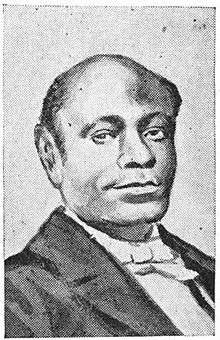William Douglass (abolitionist)
Reverend William Douglass (1804–1862) was an abolitionist and church community leader. He preached for peace, racial equality, and education in the religious community.
William Douglass | |
|---|---|
 | |
| Born | Baltimore, Maryland |
| Died | Philadelphia, Pennsylvania |
| Occupation | Reverend |
| Movement | Colored Conventions Movement |
| Spouse(s) | Elizabeth, Sarah M. Douglass |
| Children | 9 |
Early life
Douglass was born in Baltimore, Maryland, to African-American parents who were not enslaved, although such was legal in Maryland at the time. He received his education from Rev. William Levington, who founded the St. James Church and School for African Americans in Baltimore, Maryland in 1824. While attending the St. James Church School, Douglass learned Hebrew, Greek, and Latin.[1]
Career
Douglass became a Methodist preacher on Maryland's Eastern shore. On June 22, 1834, Maryland's bishop Stone ordained him an Episcopal deacon at St. Stephen's Church in Cecil County.[2] Douglass then moved to Philadelphia to serve at the African Episcopal Church of St. Thomas where Pennsylvania Bishop Henry Onderdonk ordained him as a priest in 1836.[3] Douglass published his first book, a history of his church called, The Annals of the First African Church in the United States of America.[4]
Activism
Rev. Douglass advocated education in trades and academia. He also believed deeply in the spread of peace above all else, despite the religious and racial unrest which beset Philadelphia in the 1830s and continued with the Know Nothing Movement in the 1840s and 1850s. He was active in the Anti-Slavery Society.[5] He also advocated equal representation in the Episcopalian church, as in a pamphlet published in the year he died.[6]
Family life
Douglass married twice. His first wife was named Elizabeth.[7] His second wife was Sarah Mapps Douglass, who survived him by two decades.[8] Between his two marriages, Douglass produced nine children.[7] His passion for education influenced his eldest daughters Sarah, Elizabeth, Mary, Caroline to acquire trades.[7]
Death
Douglass died in Philadelphia, Pennsylvania in 1862. Records on Douglass were silenced after his death mainly due to the fact he was unsuccessful in gaining equal representation in the Episcopal diocese.
References
- Bragg, George Freeman (1922). History of the Afro-American Group of the Episcopal Church. Baltimore: Church Advocate Press. p. 95.
- Bragg, George Freeman (1909). First Negro Priest on Southern Soil. Baltimore: Church Advocate Press. pp. 15–17.
- Bragg, George Freeman (1922). History of the Afro-American Group of the Episcopal Church. Baltimore: Church Advocate Press. p. 78,187.
- Douglass, William (1862). The Annals of the First African Church in the United States of America. Philadelphia: King & Baird, printers.
- McCrummell, James (April 7, 1854). "For Fedrick Douglass Paper Anti-Colonization and Anti Nebraska Meeting". Fedrick Douglass' Paper. Retrieved March 23, 2013.
- Douglass, William (1862). The Annals of the First African Church in the United States of America. Philadelphia: King & Baird, printers. pp. 160–169.
- "Ancestry® | Genealogy, Family Trees & Family History Records". www.ancestry.com.
- "Rev William Douglass (Onbekend-1862) Find A Grave-herdenking".
External links
| Library resources about William Douglass (abolitionist) |
| By William Douglass (abolitionist) |
|---|
- ColoredConventions.org, a website about the Colored Conventions Movement, that collected biographical information about Douglass